How AI is Being Used in Ecommerce? AI Use Cases & Solutions
Imagine entering a world where shopping is seamlessly tailored just for you, from product recommendations to customer service, this is the power of artificial intelligence (AI). In 2024, AI technology has become the backbone of the retail industry, transforming how businesses operate and how consumers shop. By leveraging AI ecommerce tools, companies can analyze vast amounts of data in real-time, predicting what customers might want to buy before even they know.
The importance of AI in today’s ecommerce landscape cannot be overstated. With the ecommerce sector projected to grow 22.6% by 2027, businesses are increasingly turning to AI solutions to stay competitive. AI technology enhances customer experiences by making them more personal and engaging, driving loyalty and sales. AI solutions for ecommerce are not just about automation; they are about creating smarter, more efficient systems that can learn from and adapt to the shopping behaviors of consumers, ensuring every interaction is optimized for satisfaction and sales. Whether it’s through personalized marketing, improved search functions, or sophisticated customer service bots, Ecommerce development company adding AI to make shopping online a smoother, more intuitive experience.
Understanding AI in Ecommerce
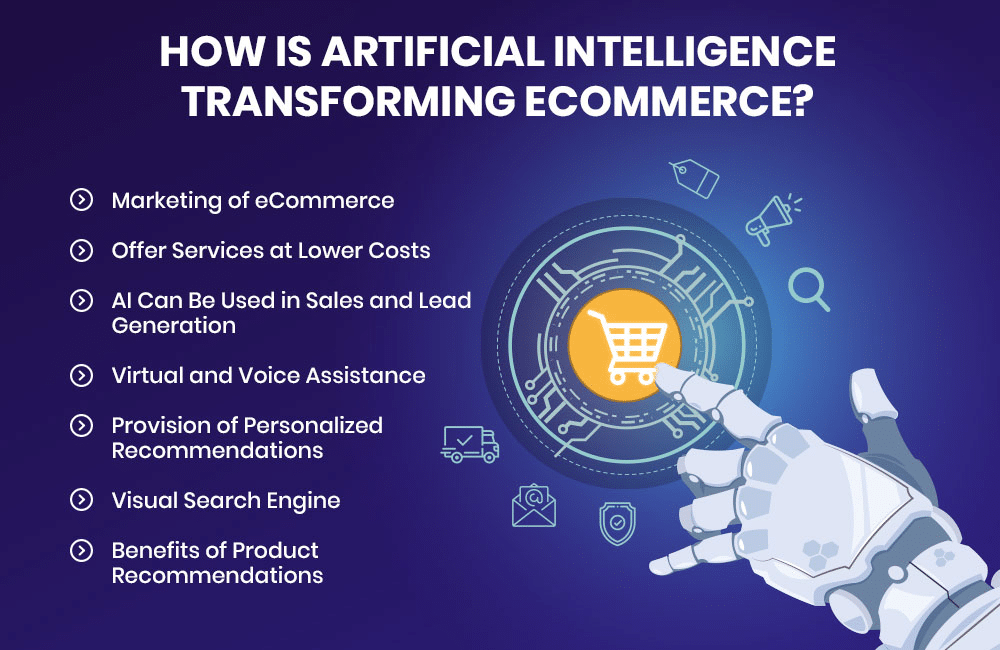
Source: https://www.qualdev.com/how-is-artificial-intelligence-transforming-ecommerce/
Artificial Intelligence helps the algorithms to think and learn like humans. In the world of online shopping, AI is becoming very important. It helps shops on the internet understand what customers like and offer them exactly what they are looking for.
AI is used in many ways in e-commerce. For example, some online stores use AI to suggest products that you might like based on what you have looked at or bought before. This is very similar to when a friend remembers what you like and recommends something new they think you will enjoy.
In 2024, many businesses have started using AI to make shopping easier and more fun. Statistics show that AI can increase sales because it makes good suggestions to customers. It can also help shops handle more orders at the same time, which is great for business.
There are many AI tools and solutions for e-commerce. These tools help with things like chatting with customers online, managing inventory, and even setting prices based on what customers are willing to pay.
Examples of AI in Ecommerce
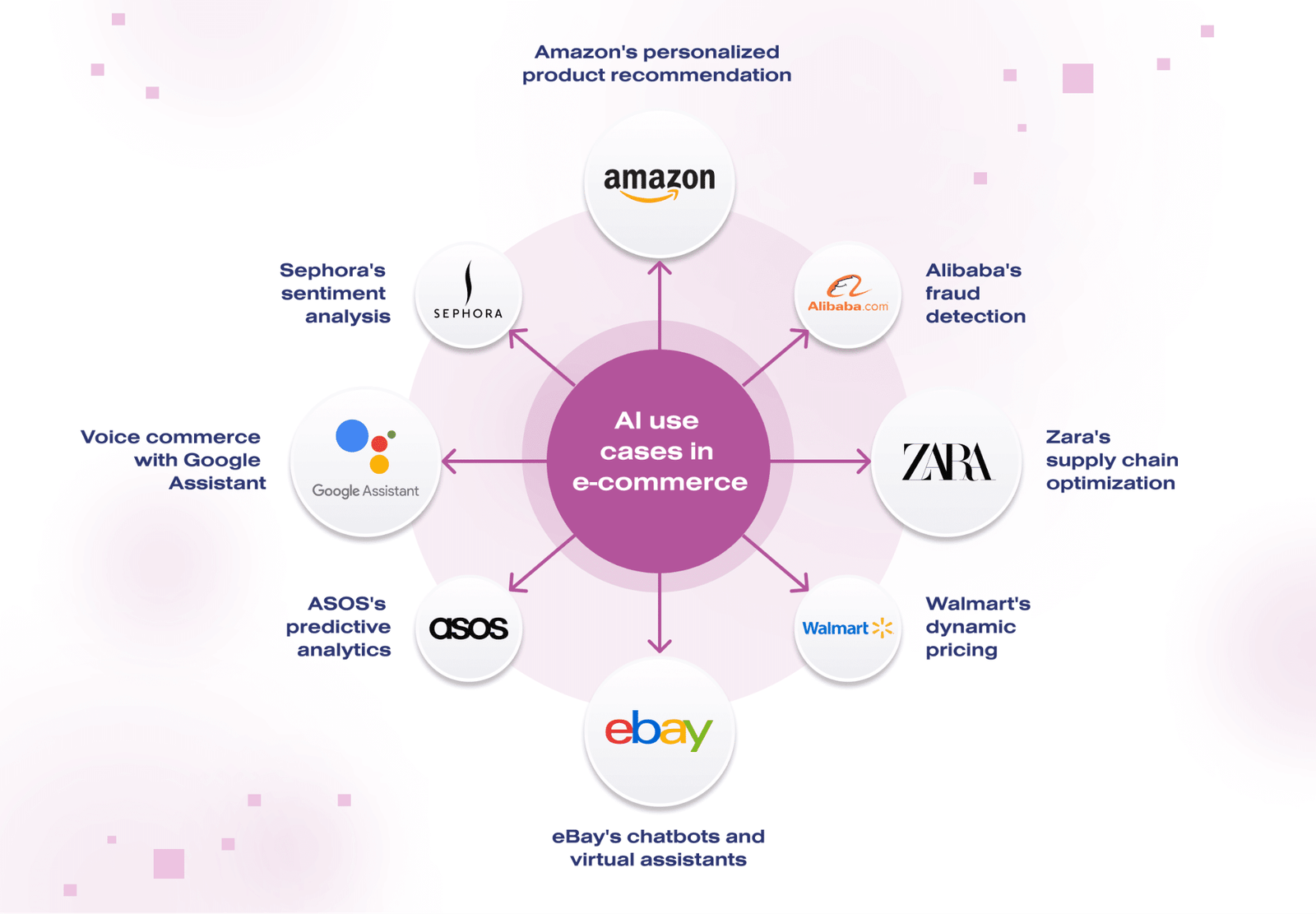
Source: https://soloway.tech/blog/ai-in-ecommerce-benefits-and-examples/
AI is like a smart helper that makes online shopping better for everyone. Here are some ways AI is used in online stores
- Personalization Engines: A great example of AI-driven personalization is Amazon’s recommendation system. This system tracks your browsing and purchasing history to suggest products that might interest you. For instance, if you’ve been looking at kitchen tools, Amazon might recommend a popular blender or a new set of knives that other customers who looked at the same items ended up buying. In 2024, Amazon reported that its personalized recommendations contribute to over 35% of their total sales, highlighting the effectiveness of this AI application.
- Chatbots and Virtual Assistants: Sephora’s chatbot on its website and Facebook Messenger is a standout example. This virtual assistant helps customers find products by asking questions about their preferences and needs, just like a beauty advisor would in-store. It can also book appointments and provide makeup tips, making it a versatile tool for enhancing customer service. This kind of AI support is available 24/7, making shopping convenient no matter the time of day.
- Inventory Management: Walmart uses AI to manage its vast inventory across its stores and online platforms. The system predicts which products are likely to sell based on trends, historical data, and seasonal demand. This AI tool helps Walmart reduce overstock and understock situations, ensuring that popular items are always available while minimizing excess inventory that could result in losses.
- AI-Driven Recommendations: Netflix might not be a traditional e-commerce platform, but its use of AI for recommendations can be mirrored in e-commerce settings. Netflix analyzes your viewing history and the patterns of millions of other viewers to recommend movies and shows you are likely to enjoy. Similarly, e-commerce sites use AI to suggest add-on products at checkout, enhancing cross-selling and upselling strategies. For example, if you’re buying a camera on a site like Best Buy, AI might suggest buying a tripod or a camera case as an add-on, based on what other customers have purchased with the same camera.
Benefits of AI in Ecommerce
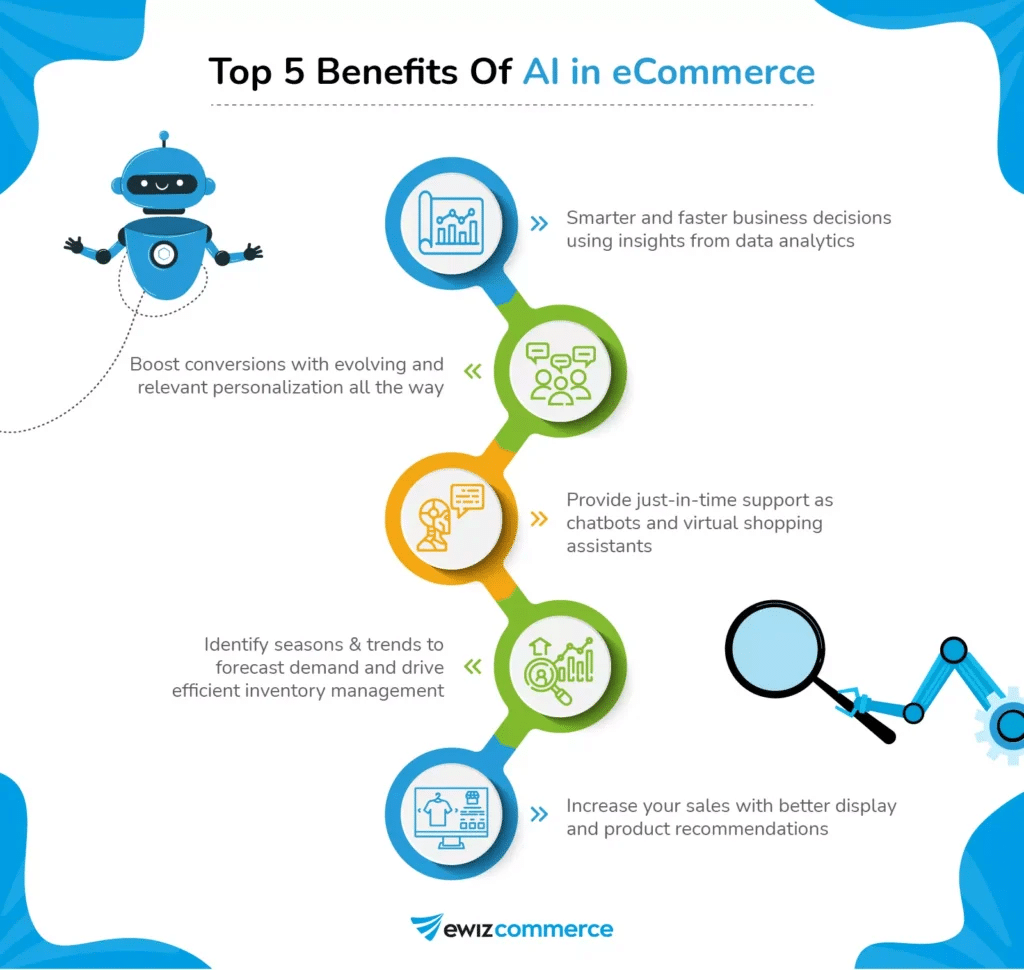
Source: https://www.ewizcommerce.com/guides/ai-ecommerce/
- Enhanced Customer Experience: AI makes shopping online feel more personal. Just like a good friend who knows your tastes, AI personalizes your shopping experience. For instance, if you visit a clothing site, AI can suggest the perfect style and size based on your past purchases and browsing habits. A real-life example is Spotify, which uses AI to suggest music based on what you’ve liked and listened to before, creating a personal playlist that feels specially made for you.
- Increased Sales: AI doesn’t just make shopping more fun; it also helps stores sell more. By suggesting products that customers might like, AI-driven recommendations increase the chances that customers will buy more. In 2024, a study found that online stores using AI recommendations saw a 35% increase in sales. This shows just how powerful a good suggestion can be.
- Operational Efficiency: AI helps online stores run more smoothly. For example, it helps manage stock by predicting which products will be popular and ensuring they are always available. This avoids the problem of products being out of stock when they are most wanted, and it prevents stores from wasting money on stock that nobody buys. A practical example is how large retailers like Target use AI to optimize their supply chains, ensuring products are moved efficiently from warehouses to where they are needed most.
- Data Analysis and Decision Making: AI is great at analyzing data. It can look at huge amounts of information from sales, customer feedback, and market trends to help businesses make better decisions. For example, AI tools can predict upcoming shopping trends, allowing stores to prepare in advance. This kind of smart planning can help businesses stay ahead of the competition and meet customer needs better.
AI use cases in Ecommerce: AI-Driven Product Experience Management (PXM)
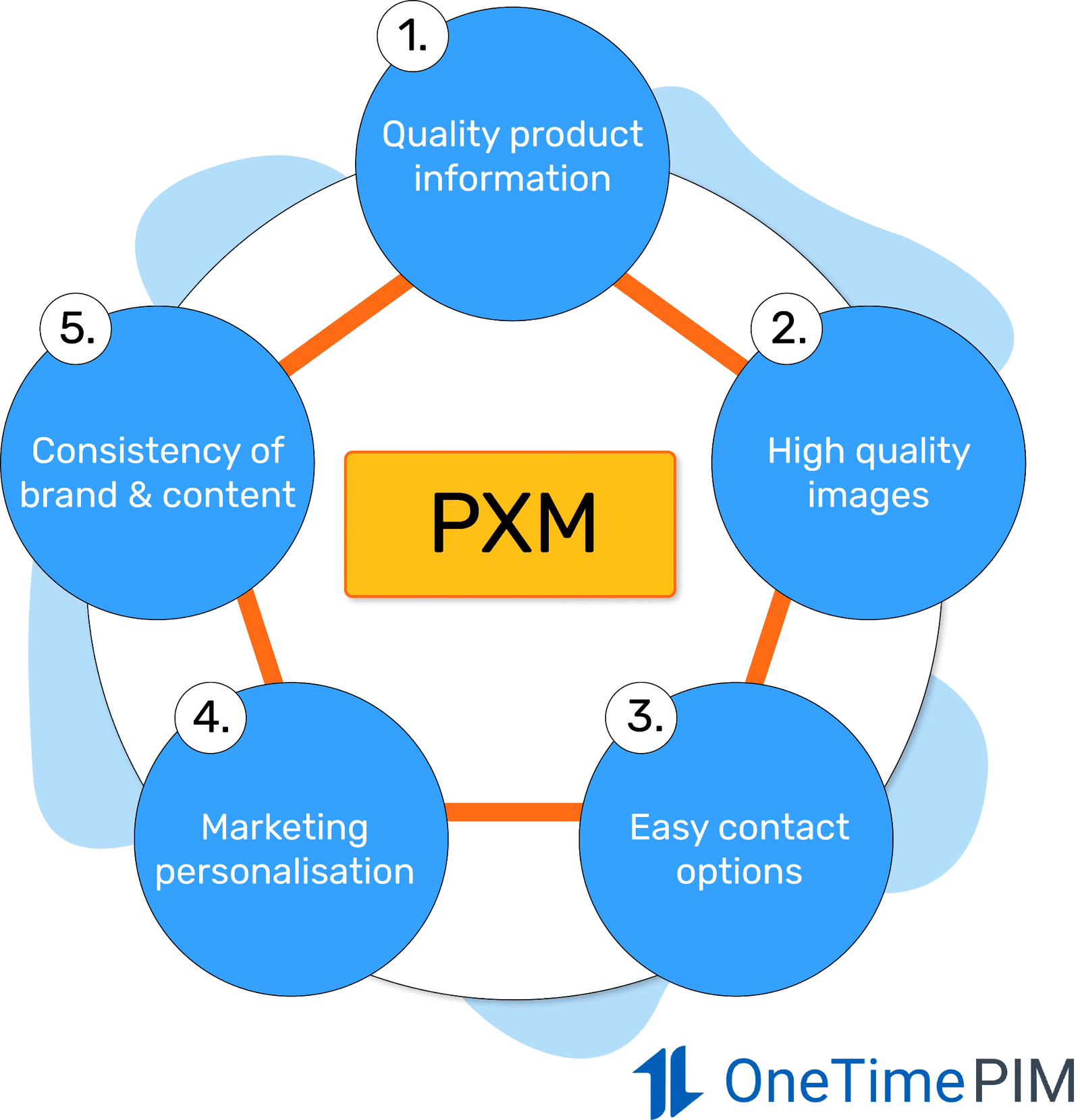
Source: https://www.onetimepim.com/blog/what-is-pxm–how-it-can-benefit-your-business
- A groundbreaking approach involves using AI, specifically generative AI, to transform Product Experience Management (PXM). This case study explores how AI is being utilized to create personalized, engaging, and seamless shopping experiences that not only meet customer expectations but also drive increased conversions and brand loyalty.
- Intelligent Content Management: Traditionally, content management involved manual creation and categorization of product information, which was both time-consuming and prone to errors. With the advent of generative AI, this process has seen a significant transformation. Generative AI automates the creation and optimization of product content, including descriptions, images, videos, and interactive experiences.
- For example, an online fashion retailer utilized generative AI to automatically generate unique product descriptions and optimized images that resonated with individual customer preferences, leading to a 30% increase in engagement rates. The AI system ensures that all content is consistent and up-to-date across various platforms, significantly enhancing the accuracy and appeal of product information.
- Hyperpersonalization: Hyperpersonalization takes customer interaction to a new level. Unlike traditional AI that segments customers into broad groups, generative AI offers a highly customized experience tailored to individual preferences.
- For instance, a sports equipment brand implemented AI to analyze customer data, enabling the creation of personalized product recommendations and promotions. This strategy led to a notable increase in customer satisfaction and a 25% rise in sales, as the recommendations were directly aligned with individual customer interests and previous purchasing behaviour.
- Experiential Product Information: Generative AI extends beyond static information to offer experiential and interactive product experiences. A notable implementation was by a home decor brand that introduced AI-driven 360-degree views and virtual reality (VR) tours of its products. Customers could virtually place furniture in their space to gauge fit and style before purchasing. This use of AI provided a deeper understanding of the products, increased customer confidence in their purchasing decisions, and reduced return rates by 40%.
- Smart Search and Recommendations: Smart search and recommendation systems powered by generative AI have drastically improved from simple keyword searches to understanding complex customer intents. An electronics retailer used AI to overhaul its search capabilities, allowing customers to find products through conversational queries.
- Privacy Concerns: One of the biggest worries about using AI in e commerce is privacy. AI systems often need a lot of personal information to make shopping experiences better. This includes what people buy, what they look at, and even personal details like their location. Customers and companies need to be sure that this information is kept safe and private. If not handled properly, there could be risks of data being lost or misused.
- Cost of Implementation: Setting up AI systems can be expensive. Small businesses or startups might find the initial costs too high. These costs include buying the right technology, hiring experts to manage the systems, and the ongoing expenses of keeping the systems running smoothly. This can be a big decision, especially for smaller companies with limited budgets.
- Integration with Existing Systems: Another challenge is making sure the new AI tools work well with what the company already has. Many businesses have older systems that might not easily connect with new AI technology. This can lead to extra work and expenses as they might need to change or update their current systems to make everything work together.
- Accuracy and Reliability: AI is smart, but it’s not perfect. Sometimes, AI can make mistakes in understanding what customers want or in managing inventory. These mistakes can lead to unhappy customers or losses for the business. Companies need to regularly check and update their AI systems to make sure they are working as expected.
- Ethical Considerations: Using AI in eCommerce also brings up questions about fairness and ethics. For example, if an AI system offers certain discounts only to specific people based on their shopping habits, is that fair to everyone? Companies need to think about how they use AI to make sure it is fair and does not harm or exclude any group of people.
- Customer Trust: Customers need to feel confident that AI technology is safe and beneficial for them. If they feel that AI is too invasive or not transparent about how it uses their data, they might choose not to shop with that business.
- Voice Shopping: More and more, people will start shopping just by talking to their devices. Voice-activated assistants like Amazon’s Alexa or Google Home are getting better at understanding what we need. In the future, you might be able to do all your shopping without ever touching a screen—just by asking out loud for what you need.
- Augmented Reality Shopping: Imagine trying on clothes or checking out how a piece of furniture looks in your room without leaving your house. Augmented reality (AR) is going to make this possible. You’ll be able to see how products look on you or in your home through your phone or glasses before you buy them. This technology will help you make better choices and reduce the hassle of returns.
- Smarter AI Recommendations: AI is already good at suggesting products you might like, but it’s going to get even better. By understanding more about your preferences, lifestyle, and even your mood, AI will offer highly personalized recommendations. It’s like having a personal shopper who knows you really well and helps you find things you’ll love.
- Automated Warehouses and Delivery: Robots and drones will play a bigger role in how products are stored and sent to you. Warehouses will use more robots to pick and pack items, making the process faster and reducing errors. Drones and robots might even deliver packages directly to your doorstep, speeding up delivery times.
- Chatbots and Virtual Assistants Becoming More Human-Like: Chatbots and virtual assistants will become more advanced, handling complex questions and offering customer service that feels more human. The web development company integrate these chatbots to the website so that they will understand customers tone and emotions better, making interactions smoother and more friendly.
- Sustainable and Ethical Shopping: As people become more concerned about the environment and ethical issues, AI will help companies become more sustainable. AI can optimize shipping routes to save fuel, suggest eco-friendly products, or even help companies source materials that are more sustainable.
- Enhanced Security with AI: With the increase in online shopping, security is more important than ever. AI will help protect your personal information from fraud by detecting unusual activity and offering safer ways to pay online.
The AI understood the context and nuances of customer requests, leading to more accurate search results and tailored recommendations. This capability not only enhanced user experience but also boosted sales by 35% due to higher relevancy and customer engagement.
Challenges and Considerations of AI in Ecommerce
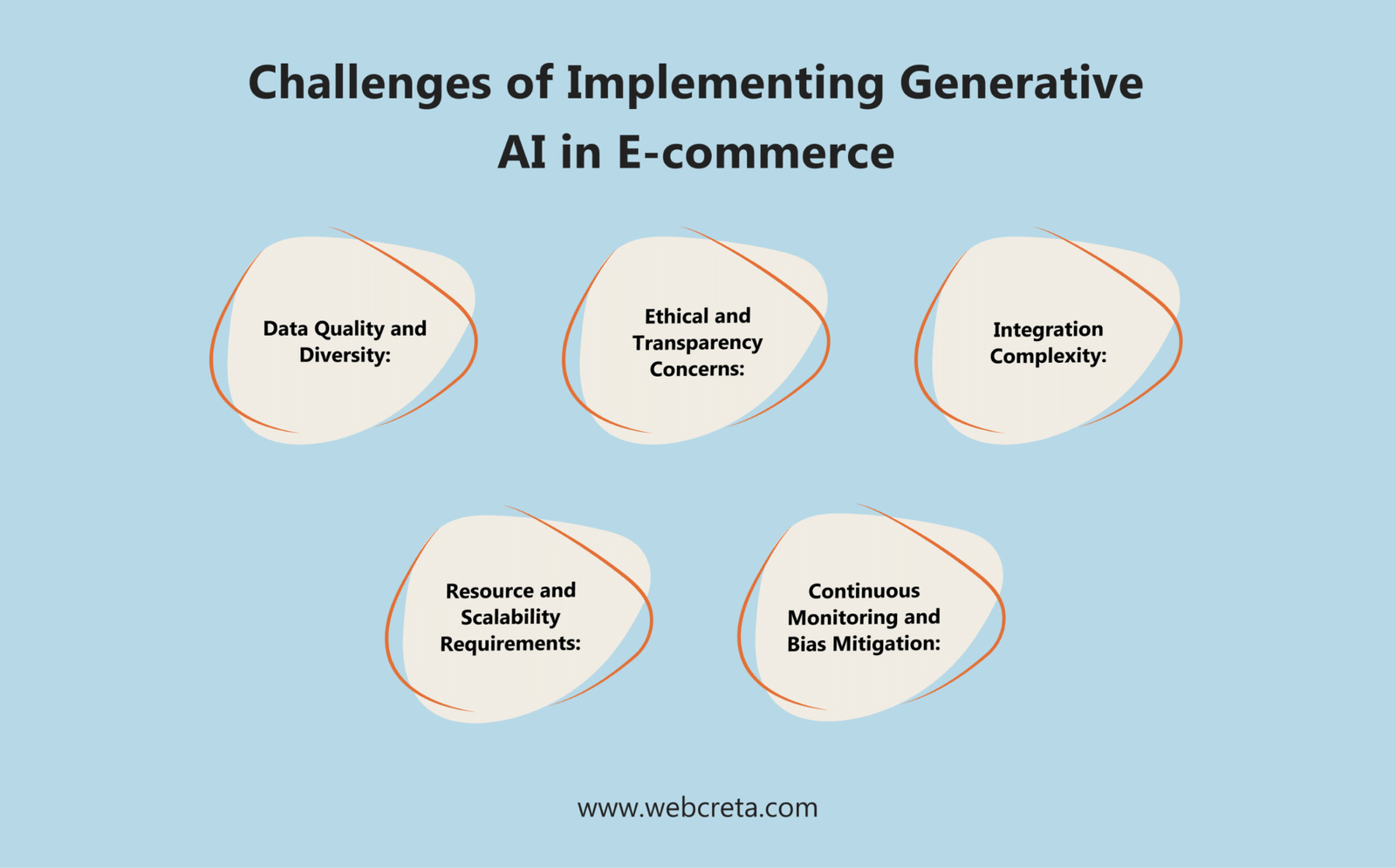
Source: https://www.webcreta.com/how-to-use-generative-ai-in-ecommerce-to-increase-sales/
While AI has brought many improvements to online shopping, it also comes with challenges and important points that need careful thought
AI and Ecommerce: Future Trends
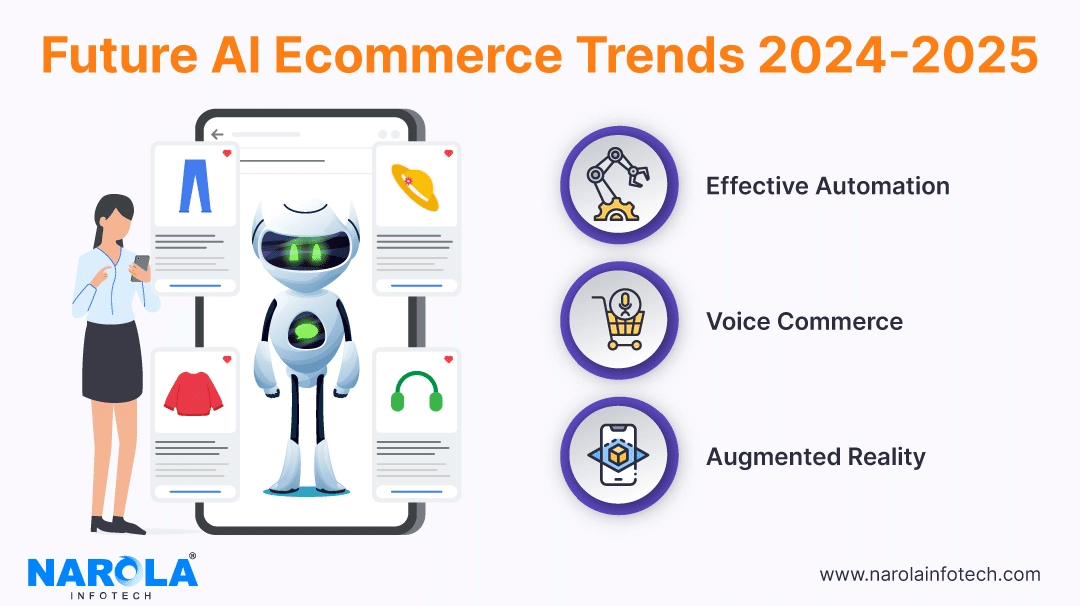
Source: https://www.narolainfotech.com/blogs/ai-in-ecommerce/
As we look ahead, the relationship between AI and eCommerce is set to become even stronger, transforming the way we shop online in exciting ways. Here’s what we can expect
Conclusion
From intelligent content management that personalizes your interactions, to AI-driven recommendations that feel like they’ve been curated just for you, AI tools and solutions are making shopping online smoother, more intuitive, and surprisingly personal. Companies are leveraging these AI solutions to understand their customers better than ever before, predicting what products will be hits and ensuring they are readily available, thus making sure that every customer interaction is impactful and meaningful.
Experts believe that the integration of AI in eCommerce is only just beginning to show its potential. As technology advances, the next wave of AI is expected to introduce even more profound changes. Imagine AI that not only recommends products based on your past preferences but anticipates your needs before you even recognize them yourself. This is the exciting future we’re approaching, and the implications for businesses and consumers alike are massive. As one AI expert puts it, “We’re not just watching the evolution of eCommerce but participating in a revolution that redefines the very nature of buying and selling.” What does this mean for the future of your online shopping carts? The possibilities are boundless, and the next chapter is just around the corner.
SHARE THIS POST












